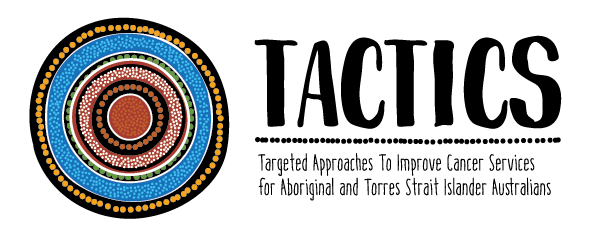PROVIDE APPROPRIATE CARE TO ENHANCE ABORIGINAL AND TORRES STRAIT ISLANDER CANCER SURVIVORShip experiences
Research Theme 3
Theme Leaders: Prof Gail Garvey and A/Prof Ben Smith
Cancer causes multiple physical, emotional, financial and social health issues as a result of many interacting influences, with cultural differences in how Aboriginal and Torres Strait Islander people perceive cancer and cope with their illness.
Research on identifying psychosocial needs, and salient quality of life, wellbeing and survivorship factors relevant to Aboriginal and Torres Strait Islander cancer survivors and their carers is paramount to ensure optimal management and care and, in the longer term, improve cancer outcomes.
These projects have contributed to the evidence-base to address these gaps.
PROJECTS
-
This is a completed project.
Aims
To implement the Supportive Care Needs Assessment Tool for Indigenous People (SCNAT-IP) into the cancer care framework in Australia.
Outcomes
The SCNAT-IP is a psychometrically robust tool which can be used by health professionals in cancer care services to identify the unmet supportive care needs of Indigenous patients and families. It is the only culturally appropriate tool of this type for Indigenous Australians. A SCNAT-IP website was developed www.scnatip.org. The website hosts the on-line training module, completion of which is a pre-requisite for accessing the tool.
The project, now completed, delivered face-to-face training workshops to over 150 health professionals delivering cancer care to Indigenous cancer patients across Australia. Workshops were delivered in NSW, Qld, SA, and the NT, in urban, rural and remote settings. By the end of the project, the SCNAT-IP had been implemented into routine practice in several cancer care settings including, Canberra Hospital, the Alan Walker Cancer Centre, and one Indigenous community-controlled health service, IUIH, which had received targeted, organisation-based training.
The inclusion of the SCNAT-IP into the Cancer Australia Optimal Care Pathway for Aboriginal and Torres Strait Islander people with cancer provides a driver for wider uptake of the tool by embedding it into policy and practice frameworks.
Visit www.scnatip.org for information and training on how to use the SCNAT-IP.
Investigators
Gail Garvey (The University of Queensland) and Jenny Brands (Menzies School of Health Research)
Contact
Prof Gail Garvey
Professor of Indigenous Health Research at The University of Queensland
-
This is a current project.
Aim
The Supporting Our Carers Study (SOCS) is seeking to understand the supportive care needs of informal carers of Aboriginal and Torres Strait Islander cancer patients. This will lead to the development of a tool to identify carers’ needs and assist with the provision of systems and services to help address these needs. This work is informed by our previous work in identifying Indigenous cancer survivors’ unmet support needs and developing, validating and translating a culturally-specific tool into the usual cancer care setting.
Outcome
We will address a critical knowledge gap regarding the lived experiences and support needs of carers of Aboriginal and Torres Strait Islander cancer patients, and develop a tool appropriate for carers to enable accurate assessment of, and responses to, their unmet needs.
Investigators
Prof Gail Garvey, Dr Abbey Diaz (The University of Queensland), Prof Joan Cunningham (Menzies School of Research), Prof Afaf Girgis, Prof Clare Wakefield (University of New South Wales), Prof Samar Aoun (University of Western Australia), Dr Shaouli Shahid (Curtin University), A/Prof Ben Smith (University of Sydney).
Contact
Prof Gail Garvey
-
This is a completed project.
Approach
We will implement a tool to measure wellbeing for Aboriginal and Torres Strait Islander people, developed through the What Matters project.
The What Matters 2 Adults (WM2A) wellbeing measure is grounded in the values and preferences of Australia’s First Peoples. Our team is implementing WM2A in partnership with the Cancer Institute NSW and 8 cancer services in 4 local health districts in NSW. Our goal is to understand the best way of using WM2A in clinical care to measure and address patients’ wellbeing needs.
Outcomes
This project will guide broad, evidence-based implementation of WM2A and improve our understanding of how culture and health contribute to wellbeing. This project is funded by the Medical Research Future Fund (MRFF) Indigenous Health Research Fund and is being led by our collaborators from the University of Sydney.
Investigators
Prof Kirsten Howard (The University of Sydney), Prof Gail Garvey, Dr Kate Anderson, Mrs Erika Langham (The University of Queensland).
Contact
Prof Gail Garvey
-
This is a ccmpleted project.
Aim
The overall objective of this study is to optimise the cancer survivorship experience for Aboriginal and Torres Strait Islander people living with cancer through the development of a model of best practice for survivorship care.
Approach
A 4-stage process e-Delphi process was conducted:
Online Survivorship Roundtable to explore what survivorship means to Aboriginal and Torres Strait Islander people, current survivorship models of care and priorities for improving survivorship care
Online survey to establish importance and achievability of Phase 1 items
Online survey to re-rate importance and achievability and identify barriers to these
Stakeholder workshop to identify solutions to barriers.
Data analysis and write-up is currently underway.
Investigators
Prof Gail Garvey, Dr Bronwyn Morris, Dr Bena Brown, Dr Daniel Lindsay (The University of Queensland)
Contact
Prof Gail Garvey
-
This is a completed project
Aim
In collaboration with Breast Cancer Network Australia, using a mixed-methods approach, this project will be the first to assess fear of cancer recurrence (FCR) among Aboriginal and Torres Strait Islander women diagnosed with breast cancer. This project aims to:
1) Quantify levels of FCR among Aboriginal and Torres Strait Islander women diagnosed with breast cancer;
2) Gain an in-depth qualitative understanding of FCR and explore coping strategies used by Aboriginal and Torres Strait Islander women to deal with FCR.
Outcomes
A greater understanding of FCR among Aboriginal and Torres Strait Islander people is urgently needed and results from this study can inform further research into the development of supportive care interventions for Aboriginal and Torres Strait Islander women diagnosed with breast cancer.
Investigators
Prof Gail Garvey, Dr Tamara Butler, Dr Bena Brown, Dr Kate Anderson, Dr Bronwyn Morris (The University of Queensland), Kirsten Pilatti (CEO, Breast Cancer Network Australia)
Contact
Prof Gail Garvey
-
This is a TACTICS-funded pilot project
Background & Aim
This project is Phase 2 of the above FCR project with BCNA. A systematic review of FCR interventions by the lead investigator and others found robust evidence for their efficacy in treating FCR, but none were designed for/with First Peoples.
Phase 2 of the FCR study aims build on the understanding of FCR in Phase I participants, and to explore culturally responsive ways of addressing FCR.
Approach
Aboriginal and/or Torres Strait Islander women with a breast cancer diagnosis will be recruited through Breast Cancer Network Australia (BCNA). Participants will complete a Qualtrics survey about FCR severity, followed by a semi-structured interview explore the participants’ experiences of fear of cancer recurrence and recommendations for improvements to care.
Outcomes
A greater understanding of FCR among Aboriginal and Torres Strait Islander people is urgently needed and results from this study can inform the development of supportive care interventions for Aboriginal and Torres Strait Islander women diagnosed with breast cancer.
Aboriginal and Torres Strait Islander women’s recommendations and preferences to improvements to care will be generated to inform service delivery.
Investigators
A/Prof Ben Smith, Dr Verena Wu (The University of Sydney), Prof Afaf Girgis (University of NSW), Dr Bena Brown, Prof Gail Garvey (The University of Queensland).
Contact
Dr Verena Wu
Research Fellow, Daffodil Centre
-
This is a TACTICS-supported project.
Background & Aim
This project sought to explore Aboriginal and Torres Strait Islander people’s understanding of Advance Care Directives.
Approach
Yarning Circles or individual Yarns were undertaken with urban and rural Aboriginal participants in South Australia.
Outcomes
Coming soon
Project Team
Prof Ian Olver, A/Prof Jaklin Elliot, Christine Doolan - Masters Student (University of Adelaide), Halijah Brewster, Elaina Elder-Robinson (The University of Queensland).
Contact
Prof. Ian Olver
School of Psychology, The University of Adelaide
-
This was a TACTICS-funded Pilot project.
Aim
To conduct an exploratory study to produce new information about the drivers of cardiovascular risk in women with breast cancer.Methodology
The cohort will be drawn from the Australian Longitudinal Study of Women’s Health (ALSWH).
Cardiovascular-related hospitalisations among women with breast cancer will be examined, based on women’s health service accessibility and geographical remoteness.
The following factors will be explored:
person-related (e.g., obesity, smoking)
socio-economic (e.g., income, education)
cancer-related (e.g., stage)
geographical (e.g., remoteness)
Investigators
Dr Abbey Diaz (The University of Queensland and Australian National University), Dr Louise Wilson, Mi Hye Jeon, Prof Gail Garvey (The University of Queensland).
Contact
Mi Hye Jeon
Research Officer and HDR Scholar, The University of Queensland

